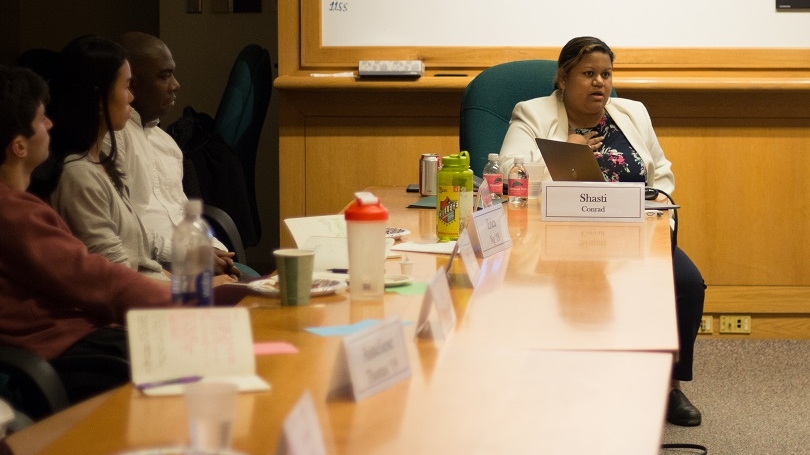
- Public Policy
- Leadership
- Funding
- News & Events
- About the Center
Back to Top Nav
Back to Top Nav
Back to Top Nav
Back to Top Nav
Shasti Conrad is a dynamic force, working to empower diverse and inclusive voices so that all people can be part of bettering our world. An inspiring speaker and activist in her own right, she also has an impressive background of working with three Nobel Peace Prize winners, President Barack, Malala Yousafzai, and Kailash Satyarthi. She now works as the U.S. campaign manager for the 100 Million Campaign, a youth mobilization effort to end child labor and trafficking.
She led the Fellows in a session entitled “Activism and Institutional Change.” She kicked off the session by sharing her philosophy on creating positive change that centers around “people-powered policymaking.” She encouraged the Fellows to emulate leaders engaged in problem-solving from an inclusive lens and to break down barriers so that others can get through them. She challenged the Fellows to not just recreate the same structures of power and inequality but to disrupt them. Shasti told us that Malala taught her, “your life is a gift –an opportunity to change the world for the better each day,” and that sentiment can motivate each of us to do good in the world.
Drawing from her experience working on the Obama campaigns and in the White House during the push to pass the Affordable Care Act, she showed how story-telling that connects back to a specific policy can bring people together to take action and facilitate lasting improvements to structural issues. She walked the Fellows through a cycle of various lenses of story: the story of the self, the story of now, and the story of us, which together help communicate a sense of purpose, urgency, and community around an issue. Using the example of Marcelas Owens, who gave a powerful testimony as an 11-year old in Congress about the importance of healthcare access, Shasti asked the Fellows to engage in discussions about the nature of narrative in current events in shaping and shifting public opinion.
We engaged in a simulation during which the Fellows took on various roles as government representatives, budget officers, civic organization representatives, and concerned constituents to try and create a plan for expanding women’s access to healthcare in New Hampshire. In this exercise, the Fellows practiced story-banking and coalition building and experienced the challenges of achieving a programmatic goal when politics and policy mix.
Shasti ended the session by reminding us that we are not a voice for the voiceless but just the ones holding the microphone. We left the session reflecting our responsibility as leaders to use our platform to elevate the experiences and needs of those with less access.
Written by Erica Ng, Class of 2019 Rockefeller Leadership Fellow
As Rockefeller Leadership Fellows, seniors gain a better understanding of the qualities and responsibilities expected of leaders. As Fellows take part in the workshops, dinner discussions, and team-building exercises, they examine their skills, qualities, and attributes as leaders and analyze how these influence teamwork and achieving goals.